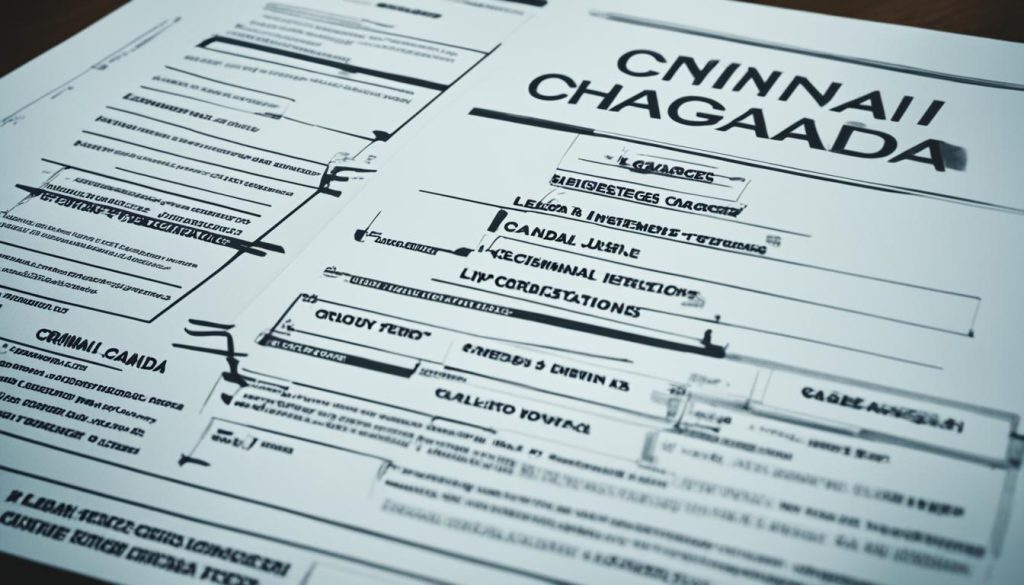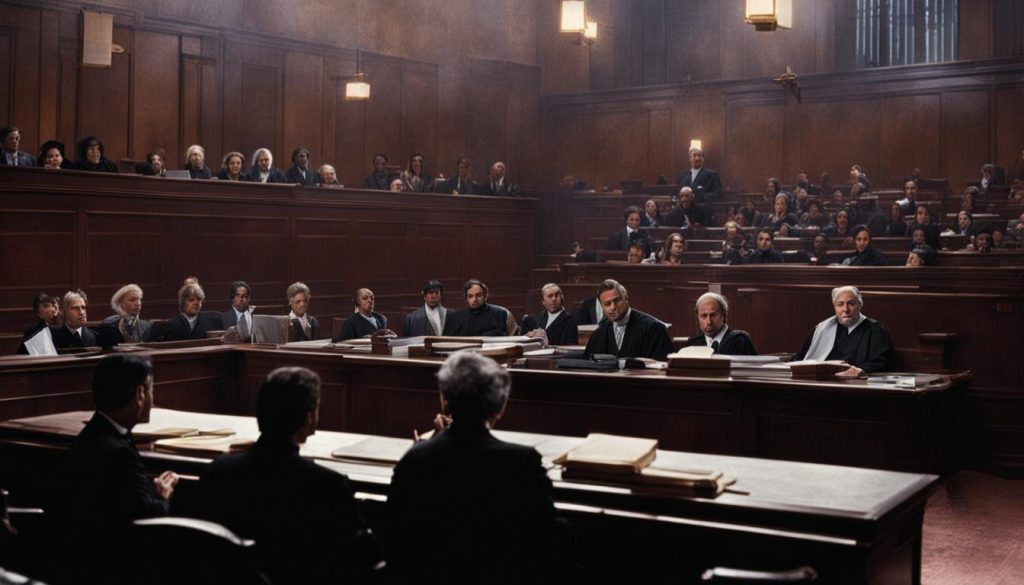Understanding Felony Charges in the Legal System
Did you know that felony charges in the Canadian legal system can result in severe penalties? Felony offenses are considered attacks on society and public good, and they carry significant consequences for those convicted. Whether it be assault, theft, or impaired driving, understanding the nature of felony charges and their potential impact is crucial.
When facing criminal charges, it is essential to navigate the complex legal system with knowledge and guidance. From the initiation of charges to the trial process and court decisions, every step can have a profound effect on your future. Let’s delve deeper into the Canadian criminal justice system and the implications of felony convictions.
Key Takeaways:
- Felony charges are serious criminal offenses that carry severe penalties in Canada.
- The criminal justice system is a combination of federal and provincial courts, with the federal government handling more serious cases.
- Understanding the specific felony offenses listed in the Criminal Code is crucial to comprehend the potential penalties and consequences.
- The trial process is essential in determining the guilt or innocence of the accused.
- Navigating the legal system for felony cases can be a lengthy and complex journey.
The Criminal Justice Process in Canada
The criminal justice system plays a vital role in upholding justice and ensuring a fair process for individuals accused of felony charges in Canada. This process involves several stages and is designed to safeguard the rights of both the accused and the victims. Understanding the criminal justice system is crucial for anyone involved in a criminal case, whether as a defendant or a witness.
The journey through the criminal justice process begins with the initiation of charges, which can occur through a criminal complaint or an arrest. At this stage, the defendant will have an initial appearance before a magistrate, where they will be informed of their rights and bail conditions will be reviewed. This appearance is also an essential opportunity for the defendant to determine if legal representation, such as a criminal law attorney or criminal defense lawyer, is necessary.
If the case proceeds, a preliminary hearing may be held to determine if there is enough evidence to proceed with the charges. This step allows the court to evaluate the strength of the prosecution’s case and provides an opportunity for the defense to challenge the evidence presented. In some cases, a grand jury may be convened to review the evidence and decide whether the case should be prosecuted.
Once the case proceeds to trial, both the prosecution and the defense will have the opportunity to present their case. Witnesses may be called to testify, and evidence will be examined. It is important for defendants to have competent legal representation, such as a criminal defense lawyer, who can challenge the prosecution’s case, present evidence in their favor, and protect their rights throughout the trial.
Following the trial, if the defendant is found guilty, a sentencing hearing will be held to determine the appropriate punishment. The severity of the felony charges will influence the range of penalties, which can include fines, probation, or imprisonment. The sentencing hearing provides an opportunity for the defense to mitigate the punishment by presenting relevant factors that should be considered.
Throughout the entire criminal justice process, defendants should seek the assistance of experienced legal professionals, such as criminal defense lawyers or criminal law attorneys, to navigate the complexities of the system, protect their rights, and achieve the best possible outcome.

Felony Offenses in the Criminal Code
The Criminal Code of Canada encompasses a wide range of felony offenses, each carrying its own set of penalties and consequences. These offenses span from assault and theft to impaired driving and terrorism, demonstrating the gravity and diversity of felony charges in the country. When it comes to felony offenses, they are categorized as either summary offenses or indictable offenses based on their severity and the harm they cause to individuals or society.
Summary offenses are considered relatively minor criminal acts that do not entail significant harm. These offenses may result in penalties such as fines or community service. On the other hand, indictable offenses are more serious crimes that have caused harm or endangered others. The penalties for indictable offenses can vary greatly, ranging from fines and probation to lengthy prison sentences, depending on the specific circumstances of each case.
It is crucial for individuals facing felony charges to comprehend the potential penalties they may be subject to if convicted. Understanding the consequences of a felony conviction is key, as it can have long-lasting effects, including the establishment of a criminal record and difficulties in finding employment or housing.
By being aware of the felony penalties and conviction consequences outlined in the Criminal Code, individuals can make informed decisions, navigate the legal process effectively, and potentially mitigate the impact of a felony conviction.
The Trial and Court Decisions
The trial process is a critical aspect of the legal system that determines the guilt or innocence of a defendant facing felony charges. During a criminal trial, evidence is presented, witnesses are examined, and legal representatives argue their respective cases. It is important to remember that the accused is considered innocent until proven guilty beyond a reasonable doubt.
Throughout the trial, the judge or jury carefully evaluates the evidence presented to make a decision. The court analyzes the credibility and relevance of witness testimony, the admissibility of physical evidence, and the strength of legal arguments from both the prosecution and defense. This careful examination ensures that the decision is grounded in a fair and unbiased assessment of the facts.
If the accused is found not guilty, they are acquitted, and their rights are protected. They are free to return to their normal life without the burden of a criminal conviction. On the other hand, if the accused is found guilty, the judge will determine an appropriate sentence based on several factors, including the nature of the crime and any mitigating circumstances. Sentences can range from fines and community service to imprisonment, depending on the severity of the offense.
Understanding the trial process and the potential court decisions is crucial for individuals facing felony charges. It allows them to navigate the legal system with knowledge and make informed decisions about their defense strategy. By working closely with their legal representation and presenting a strong case, defendants can strive for a fair outcome that upholds their rights and ensures justice.

| Key Points | Benefits |
|---|---|
| Comprehensive examination of evidence and witness testimony | Ensures a fair and objective decision-making process |
| Opportunity for the accused to present their defense and challenge the prosecution’s case | Ensures a balanced and thorough assessment of the facts |
| Promotes transparency and accountability in the legal system | Builds public trust and confidence in the justice system |
| Allows for the possibility of acquittal and exoneration | Protects the rights of individuals accused of crimes |
| Ensures appropriate sentencing based on the specific circumstances of the case | Promotes proportionality and fairness in punishment |
The Journey Through the Legal System
The journey through the legal system in Canada for felony cases involves several crucial steps that ensure a fair and just outcome. It all begins with the initiation of charges, where a person is formally accused of committing a felony offense. Following this, the defendant appears before a magistrate who explains their rights and reviews the conditions for their release on bail.
If the case proceeds, a preliminary hearing is held to assess the available evidence and determine if there is sufficient grounds for the charges to proceed. In some instances, a grand jury will convene to review the evidence and decide whether an indictment should be issued.
Throughout the legal process, witnesses play a pivotal role. Witness testimony can be called upon at various stages, including the grand jury hearing and the subsequent trial. Testimony from witnesses provides crucial insights and evidence that helps to establish the facts surrounding the case.
Once the trial is complete and a guilty verdict is reached, a sentencing hearing takes place. During this hearing, the judge reviews the circumstances of the case, considers any mitigating factors, and determines an appropriate punishment for the convicted individual. Sentences can range from fines and probation to significant periods of imprisonment, depending on the severity of the felony offense.
- The Role of Police in Community Safety & Unity - October 6, 2025
- Quebec Police Officer Salary Insights 2023 - July 13, 2025
- Canada Arrest Protocol: What Police Say Upon Arrest - June 12, 2025




















Post Comment